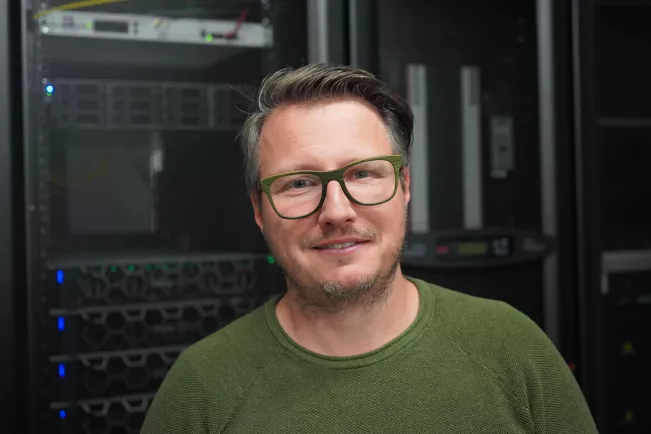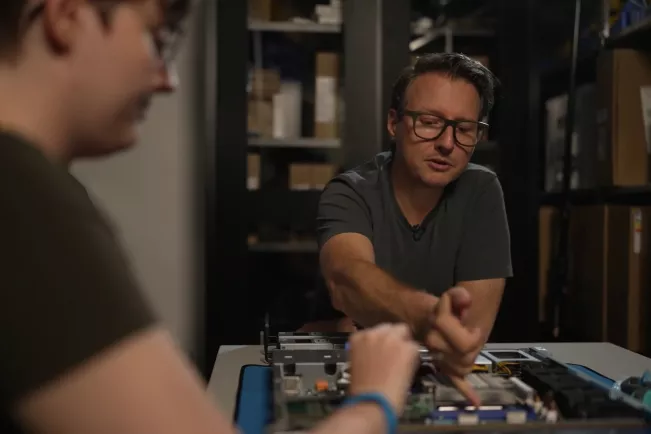Communications and Marketing
Patrick Becker: The ability to reinvent yourself

It was nothing less than a culture shock, recalls Patrick Becker. The son of a soldier in the German army had spent the first few years of his school career in the US capital Washington D.C., and now the family was back in Germany, more precisely in the municipality of Ruppichteroth. The teenager wasn't very familiar with village life and German club life: "In Germany, everything was much smaller, more compact and more bourgeois than in the USA. For a long time, I simply didn't have anything in common with my classmates," he recalls.
While his peers were competing against each other on the football pitch, Becker was assembling his first computers at home. He was ahead of his time in 1980s Germany: "Back then, you couldn't just go into a shop and choose from many different computers. If you wanted a computer, you had to put it together yourself," Becker remembers today. He quickly took a liking to "tinkering" until the device finally worked.
From work for medical research to the emergency vehicle
Turning his hobby into a career was initially not possible in the 1990s, as there was simply no training in computer science. However, an apprenticeship in a local crafts enterprise was out of the question. So he finally began his training as a communications electronics technician in Bonn and then used the knowledge he had gained to develop prototypes for medical research at university.
However, Becker did not stay in this profession for long. After completing his civilian service in an emergency vehicle, he quickly changed career and became a paramedic. That was also exciting, especially the diagnostics: "With every patient, you have to find out as quickly as possible what is causing their symptoms. It helps to proceed systematically, gather information and then make an initial diagnosis. The procedure is not so dissimilar to fault diagnosis in IT," explains Becker.
He then worked in the emergency services for almost eight years, where he says he experienced the whole range of fates, from 'another good day' to the death of a new father. Becker eventually switched to a less physically and mentally demanding job. He drove patients to their hospital appointments every day as an ambulance driver - until one morning in 2006: "I was standing at a set of traffic lights on the way to the hospital, looked out of the window and thought to myself: I have to get out of here and do something more meaningful. The next day, I handed in my notice," he recalls.
Keeping the system running
Becker then trained as an IT specialist and finally started working at the university in 2008. Today, as part of the network development team, he is responsible for ensuring that all employees and students can carry out their work - no easy task at an institution with so many users and end devices.
"The size also makes it more exciting in terms of IT, because everything is more complex. What's more, research, administration and students have very different IT requirements - worlds collide here, so to speak. And above all, of course, there is the obligation that everything must always work. " says Becker.
In addition, every day is also about "keeping the bad guys out", as the computer scientist puts it, i.e. fending off the numerous cyberattacks on the university networks. A new data centre, which will be built on the Sankt Augustin Campus in May, will now also contribute to this. The data centre will house the servers on which all university member data is stored. Becker planned the new premises together with his colleagues: "The previous data centre has been in existence for almost 20 years. With the new location, we can modernise our servers during ongoing operations and adapt them to current security requirements," says Becker.

No room for lone wolves
In order to be able to tackle the diverse tasks, it is important to work closely together as a team: "There is no room for lone wolves here. Our areas of work are simply too complex for that. Without the expertise of each individual and constant dialogue, it wouldn't work," says Becker.
In order to contribute to secure IT systems in the future, the Institute for IT Service (ITS) at H-BRS is also training young people itself to become specialists in system integration (see info box). They are technically supervised by Patrick Becker, who initiated the training programme in its current form: "Tinkering with devices with the trainees is simply fun and is something completely different to the usual working day. And of course it's also nice to see them being able to complete tasks independently on the basis of our training," says Becker.
What all areas of IT have in common is that everything changes very quickly and you have to constantly stay on track: "You can never really do anything by the book, you have to reinvent yourself every few years," he says. A sentence that also applies to Becker's entire career.
Text: Pascal Schröder
*Zusatzinfo
Kontakt

Location
Sankt Augustin
Room
E 244
Address
Grantham-Allee 20
53757 Sankt Augustin
Telephone
+49 2241 865 634